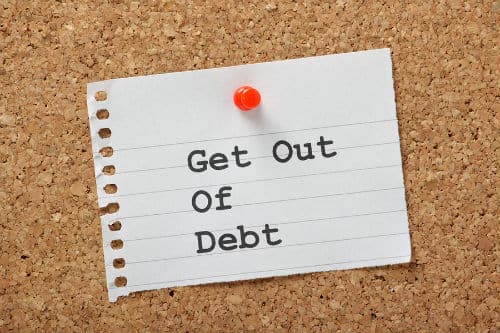If one of your personal or financial goals is to get out of debt this year – or at least eliminate your debt as soon as possible – now is a great time to get started. Becoming debt-free takes work. But it doesn’t have to be an overwhelming chore. Simply following proven strategies below to knock out your debts sooner rather than later:
1) Write down all your debts.
To get a clear sense of your finances, you really need to know exactly how much you owe, to whom, and how much interest you’re paying on your debts. You don’t want to guess about debts. Do you owe $5,900 or is it more like $9,500? Getting your bills listed in black-and-white is a sure-fire way to simplify your finances and see where your cash is going. To get a jumpstart on this process, download this free form called “I Debticate Myself to Being Debt Free.” It will help you list all your debts.
2) Call your creditors and negotiate your interest rates.
Even though banks have been raising interest rates during the credit crunch, in 2010 you’ll have more power to negotiate with your creditors. Why? Starting February 2010, key provisions of the Credit Card Reform Act begin. Among the changes: credit card companies can’t retroactively raise your interest rate on an existing credit card balance – unless you’re 60 days or more late paying your bill. Even if your rate has been raised to a “default” rate, the new law restricts creditors to hitting you with that higher for just six months, if you pay on time. So every six months or so, starting today, call up your creditors and ask for lower interest rates. Often, credit card companies will lower your rate on the spot, simply because they don’t want to lose your business to another company offering lower rates. If you can knock down the interest rate on a card with a 21% interest rate to 12% or so, you’ll be saving yourself a lot of money. Your minimum payments will also be less each month.
3) Pay your bills online.
Another benefit of the credit card reform law is that, starting February 2010, banks and other credit card issuers will be banned from charging fees to customers who pay their bills via the telephone or the Internet. So if you’re not already doing so, set up your credit cards to be paid electronically. Online bill payment is a great service for busy people. Use it as a time saver to pay those fixed monthly expenses, such as your mortgage, car note, or insurance payments. Online bill payments also helps ensure that you don’t forget to pay bills, which can result in late payments or negative marks on your credit report.
4) Pay more than the minimum amount due.
Don’t fall into the minimum payment trap. Minimum payments in the short run really mean maximum payments in the long run. To avoid paying exorbitant amounts of interest and being in debt for life, you must pay more than the minimum balance due. If possible, try to pay 2 to 3 times the minimum payment.
5) Use more cash than plastic.
Before you go shopping for anything this year, even groceries, hit the ATM first – armed with your budget and your “need” list so that you don’t buy more items than you planned, or purchase items priced higher than you should be spending. Take out exactly the maximum amount you’ve determined you can afford and will need to purchase your items of necessity (not just the items you want, but the items you “need”). Later, when you are out of cash, that’s it. Leave the mall or whatever store you’re in. Resist the temptation to whip out plastic to buy more stuff.
6. Get financial help with debt
Having lots of credit card debt lowers your credit score and forces you to live paycheck to paycheck. So if you’re struggling to pay off debt, and nothing you’ve tried has worked, consider getting help from a trustworthy credit counseling agency. One reputable resource is the National Foundation for Debt Management, a non-profit agency that negotiates with creditors, gets your interest rates lowered, and creates a plan to quickly get you out of debt. For speedy help, contact NFDM at: http://enroll.nfdm.org/ or call them toll-free at 866-409-6336, and a HUD-approved credit counselor from NFDM will get back to you within 24-48 hours for a free, no-obligation assessment of your situation.
7. Use a tax refund to pay debt
If you’re expecting a tax refund, or any other financial windfall, apply it to pay down your credit card debt. It was money you didn’t have the day before so don’t use it on luxuries. If your refund can pay off any one of your credits cards in full, pay it off. It will be one less bill you’ll have to worry about. Paying off a card will also help raise your available credit, which, believe it or not, helps to raise your credit score.
By using these techniques, you’ll be out of debt in no time.










